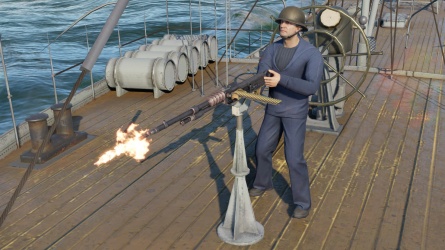Hotchkiss pattern 1914 (8 mm)
Contents
Description
The Hotchkiss Modèle 1914 machine gun, developed from earlier models reaching back to 1889, saw widespread use during World War I, primarily with the French Army. In naval service, it was adopted by the French Marine Nationale during the interwar period, where its most common use was on the twin Modèle 1926 mounts for ship's anti-air. Although it was eventually replaced by the more advanced Hotchkiss Mle 1929, the Mle 1914 returned to service during World War II to compensate for slow production of a newer guns, such as the 7.5 mm Darne which eventually replaced it.
The French 7.92 mm Hotchkiss pattern 1914 was introduced in Update "Dance of Dragons" as an anti-air gun for Arras. It has only one belt, firing AP-I ammunition without tracers with a maximum range of 1000 meters.
Vehicles equipped with this weapon
General info
The gun behaves similarly to other small-calibre heavy machine guns, lacking the stopping power to effectively deal with both aeroplanes and boats. This is made even more problematic by the use of a full belt of AI bullets without tracers.
Available ammunition
The gun fires a full belt of 7.92 mm Adjustment Incendiary bullets, which do not deal any damage beyond 1000 meters.
- Default: AP-I · AP-I · AP-I · AP-I
| Penetration statistics | |||||||
|---|---|---|---|---|---|---|---|
| Ammunition | Penetration @ 0° Angle of Attack (mm) | ||||||
| 10 m | 100 m | 500 m | 1,000 m | 1,500 m | 2,000 m | ||
| AI | 3 | 3 | 3 | 3 | 0 | 0 | |
| Shell details | ||||||||||||
|---|---|---|---|---|---|---|---|---|---|---|---|---|
| Ammunition | Velocity (m/s) |
Projectile mass (kg) |
Fuse delay (m) |
Fuse sensitivity (mm) |
Explosive mass (TNT equivalent) (g) |
Ricochet | ||||||
| 0% | 50% | 100% | ||||||||||
| AI | 855 | 0.01 | - | 3 | - | 47° | 56° | 65° | ||||
Comparison with analogues
Give a comparative description of cannons/machine guns that have firepower equal to this weapon.
Usage in battles
Hotchkiss pattern 1914 is a designated anti-aircraft gun, primarily used by AI gunners. These gunners do not begin firing until the target is less than 1 km away, making the gun a weapon of last resort and typically incapable of influencing an engagement. The lack of tracers also makes this gun extremely challenging to aim, requiring reliance on intuition and the presence or absence of hits on the target, rather than being able to correct fire based on visual cues.
Pros and cons
Pros:
- Wide arcs of fire, limited mostly by the hull of the vessel rather than the mount itself
Cons:
- It's impossible to engage targets beyond 1 km range
- A lack of tracers makes this gun very difficult to aim
- Small magazine and a long reload time (base 6.5 seconds, top 5 seconds)
History
Examine the history of the creation and combat usage of the weapon in more detail than in the introduction. If the historical reference turns out to be too long, take it to a separate article, taking a link to the article about the weapon and adding a block "/History" (example: https://wiki.warthunder.com/(Weapon-name)/History) and add a link to it here using the main template. Be sure to reference text and sources by using <ref></ref>, as well as adding them at the end of the article with <references />.
Media
Excellent additions to the article would be video guides, screenshots from the game, and photos.
See also
External links
| Naval machine guns | |
|---|---|
| USA | |
| 7.62 mm | M73 |
| 12.7 mm | AN-M2 |
| Germany | |
| 7.62 mm | MG-3 |
| 7.92 mm | MG08 pattern 1908 · MG15 · MG34 |
| 13.2 mm | Hotchkiss |
| 15 mm | MG M38(t) |
| USSR | |
| 7.62 mm | Maxim |
| 12.7 mm | DShK |
| 14.5 mm | KPV |
| Britain | |
| 7.62 mm | FN MAG |
| 7.7 mm | Lewis 1916 · Vickers GO No.5 |
| 12.7 mm | Vickers Mk.V |
| Japan | |
| 6.5 mm | Maxim · Type 38 pattern 1907 |
| 7.7 mm | Type 89 · Type 92 |
| 13.2 mm | Type 93 |
| Italy | |
| 6.5 mm | Breda Mod.30 · Fiat Model 26 |
| 12.7 mm | Breda-SAFAT |
| 13.2 mm | Breda Model 31 |
| France | |
| 7.7 mm | Darne M1922 |
| 7.92 mm | Hotchkiss pattern 1914 |
| 13.2 mm | Browning · Model 1929 Hotchkiss |




